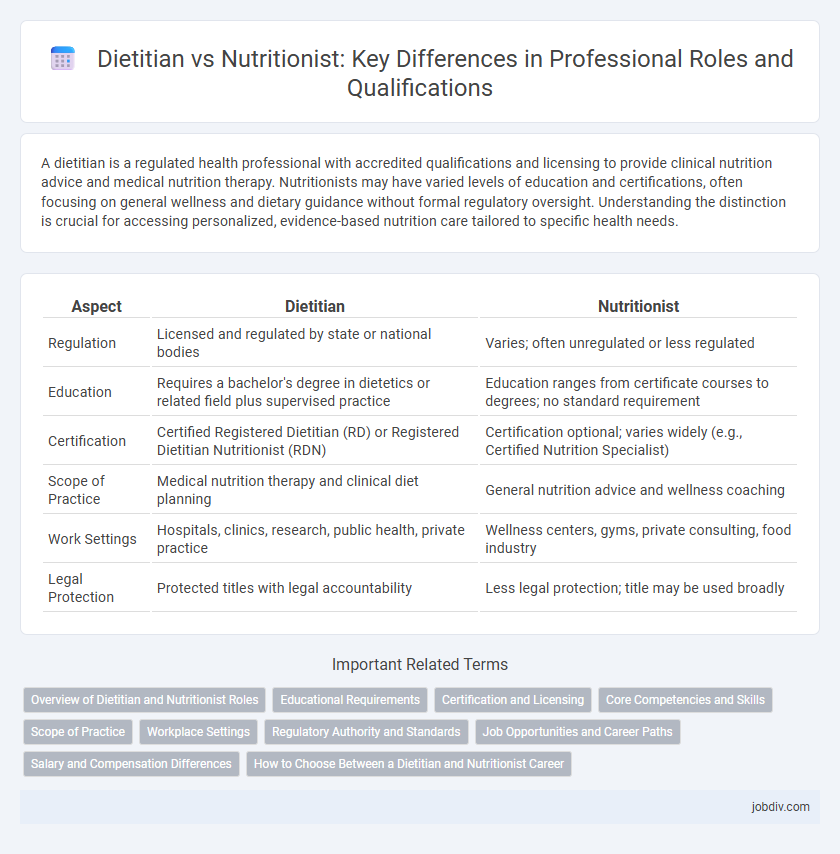A dietitian is a regulated health professional with accredited qualifications and licensing to provide clinical nutrition advice and medical nutrition therapy. Nutritionists may have varied levels of education and certifications, often focusing on general wellness and dietary guidance without formal regulatory oversight. Understanding the distinction is crucial for accessing personalized, evidence-based nutrition care tailored to specific health needs.
Table of Comparison
| Aspect | Dietitian | Nutritionist |
|---|---|---|
| Regulation | Licensed and regulated by state or national bodies | Varies; often unregulated or less regulated |
| Education | Requires a bachelor's degree in dietetics or related field plus supervised practice | Education ranges from certificate courses to degrees; no standard requirement |
| Certification | Certified Registered Dietitian (RD) or Registered Dietitian Nutritionist (RDN) | Certification optional; varies widely (e.g., Certified Nutrition Specialist) |
| Scope of Practice | Medical nutrition therapy and clinical diet planning | General nutrition advice and wellness coaching |
| Work Settings | Hospitals, clinics, research, public health, private practice | Wellness centers, gyms, private consulting, food industry |
| Legal Protection | Protected titles with legal accountability | Less legal protection; title may be used broadly |
Overview of Dietitian and Nutritionist Roles
Dietitians are licensed healthcare professionals who assess, diagnose, and treat dietary and nutritional problems based on medical evidence and clinical training. Nutritionists provide guidance on nutrition and healthy eating habits, often focusing on wellness and preventative care, but their certification requirements and regulatory standards vary widely. Both roles contribute to promoting health through diet, yet dietitians typically work in clinical settings while nutritionists often support community or private wellness programs.
Educational Requirements
Dietitians must complete a bachelor's degree in dietetics, nutrition, or a related field, followed by supervised clinical training and national registration or licensure. Nutritionists typically hold a degree in nutrition or a related area but may not require formal licensing or accredited clinical experience depending on the state. Accredited dietetic programs and certifications such as the Registered Dietitian Nutritionist (RDN) credential ensure a higher standard of professional education and competency compared to nutritionist qualifications.
Certification and Licensing
Dietitians hold nationally recognized certification, such as the Registered Dietitian Nutritionist (RDN) credential, which requires completing accredited education, supervised practice, and passing a rigorous exam. Nutritionists may have variable qualifications, with some states requiring licensure while others have no formal regulatory standards, leading to inconsistent professional credibility. Licensing ensures accountability and adherence to ethical guidelines, making dietitians distinctly qualified for clinical and healthcare settings compared to unlicensed nutritionists.
Core Competencies and Skills
Dietitians possess clinical expertise in medical nutrition therapy, including assessing nutrient needs, developing personalized meal plans, and managing dietary interventions for chronic diseases. Nutritionists focus on promoting general wellness through nutritional education, behavior modification, and community health initiatives, often emphasizing preventive care and holistic approaches. Both professionals require strong communication skills and a deep understanding of biochemistry, but dietitians undergo accredited clinical training and licensure, ensuring advanced competency in therapeutic nutrition.
Scope of Practice
Dietitians are regulated healthcare professionals with a defined scope of practice that includes clinical assessment, medical nutrition therapy, and developing personalized dietary plans for disease management. Nutritionists may have varied qualifications and often focus on general wellness, public health nutrition, or community education without the authority to provide medical nutrition interventions. The legal scope and credentialing differences significantly impact their roles in healthcare settings and patient care outcomes.
Workplace Settings
Dietitians typically work in clinical settings such as hospitals, outpatient clinics, and rehabilitation centers, where they provide medically tailored nutrition therapy. Nutritionists are often found in community health organizations, wellness programs, or private consulting, focusing on general nutrition education and preventive health. The regulated certification of dietitians enables them to work in healthcare environments requiring specialized medical knowledge and compliance with legal standards.
Regulatory Authority and Standards
Dietitians are regulated healthcare professionals required to meet strict educational and licensure standards set by recognized regulatory bodies such as the Commission on Dietetic Registration (CDR) in the United States or the Health and Care Professions Council (HCPC) in the UK. Nutritionists may not be governed by uniform regulatory authority, with certification and standards varying widely by country and often lacking legal recognition. This distinction ensures that dietitians adhere to evidence-based practices and professional accountability, whereas nutritionist qualifications and oversight can range from non-regulated to credentialed depending on jurisdiction.
Job Opportunities and Career Paths
Dietitians often have broader job opportunities in clinical settings, hospitals, and healthcare facilities due to their regulated credentials and ability to provide medical nutrition therapy. Nutritionists typically work in community health, wellness coaching, and food industry roles, offering more flexibility but fewer clinical openings. Career paths for dietitians emphasize evidence-based practice and patient care, while nutritionists may focus on preventive health, public education, and product development.
Salary and Compensation Differences
Dietitians typically earn higher salaries than nutritionists due to their extensive clinical training and certification requirements, with average annual earnings ranging from $60,000 to $75,000 compared to nutritionists' $40,000 to $60,000. Compensation packages for dietitians often include benefits such as health insurance, retirement plans, and performance bonuses, reflecting their employment in healthcare settings. Nutritionists, who may work in wellness centers or private practice, generally have less standardized salary structures and fewer comprehensive benefits.
How to Choose Between a Dietitian and Nutritionist Career
Choosing between a dietitian and nutritionist career depends on educational requirements, certification, and scope of practice. Registered dietitians (RDs) typically hold a bachelor's degree in dietetics, complete supervised clinical training, and must pass a national exam, allowing them to work in clinical and healthcare settings. Nutritionists may have varied educational backgrounds without standardized certification, often focusing on wellness, public health, or community nutrition; selecting the right path requires aligning career goals with credentialing standards and work environment preferences.
Dietitian vs Nutritionist Infographic

 jobdiv.com
jobdiv.com